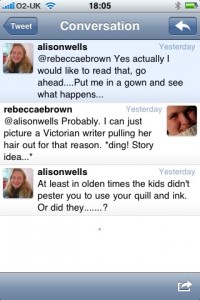I wasn’t intending to do a Friday Flash this week but there you go! Hope you like it.
Moving On
I turned and looked at the hospice I had just left. A family were also leaving, huddled together. The women were openly sobbing, the men had tears coursing down cheeks that were as tense and hard as rock. I heard their cries, but the sound all around me was muted and faint. I left them behind and walked down the road.
The buildings here were old, craggy, moss-covered. They showed their history and age in every crack and every dusty window pane. Foliage ran a little wild, and there was a smell around here of damp and mildew, mixed in with a faint memory of old wood polish and Brasso. In one, I saw an old lady cradling a newborn baby with the care she would show to a precious ornament, trembling with age and worry in case she dropped him. An empty seat beside her had a worn and faded dent, where a shadow played instead of the man who should have been there. I moved on, and the old, tumbledown buildings began to give way to more modern ones.
These also showed their age, though. Doubtless the architects had called them ‘modern’ at the time, but now they looked as dated as faded colour photographs, down to the grey uniform materials they wore. A wedding party was leaving a church here, and I saw the mother of the bride standing to one side, watching her daughter over the distance that separated them; a proud father frantically photographed and chroniclled every minute. The woman was smiling through her tears, as a video tape of memories played in front of her eyes. I knew she wasn’t seeing a bride but a little girl in her mum’s shoes, with a net curtain fastened on her head. I smiled, and moved on again.
A small row of shops reflected the sunlight merrily. The street was deserted, but the shops were full, as if I was the only living person out and the others were trapped behind the glass facades, looking out. Except they weren’t interested in what lay on the other side of the glass, they were too busy filling their shopping baskets. A woman had a trolley with two small children in. The boy turned his face up for a kiss, the girl reached for her mum’s hand. An instant later they both screwed up their faces and began to cry for some niffy-naffy thing. I shook my head at the same time as their mother, and we both moved on.
At the end of the shops a set of park gates stood open, beckoning passers-by to stop and rest in its shade. A heavily pregnant girl sat on a bench, resting her hand on her stomach and reading a book. She looked so tired, but her face was smooth, unlined, still an empty slate ready for life to write on. The sunlight winked off a brand new, shiny ring and she put her book down and closed her eyes, inhaling deeply. I copied her, drinking in the cut grass, the roses, the traces of cigarettes. I could have watched her all day, poised at the threshold of her life, but I moved on.
The houses now were newer, solid brick residences with smoking chimneys. One front door opened, and a young man came out, leaving a girl who, tearstained, slammed the door behind him. He stood a moment, head bowed, then turned and ran to the door as she opened it. They clung together, apologies and forgiveness and love tied up in one wordless embrace. I looked away from their private moment and moved on.
Towards the end of the street a girl and boy were standing together, shuffling feet and shifting heavy schoolbags from one shoulder to another. They swapped a book, fingers lingering a split second. They turned to part, then the girl dropped everything and planted a kiss on the boy’s cheek. He stared, touched his cheek, and I mimicked every gesture reverently, reliving the moment as if it were yesterday. He turned and ran, and I moved on.
On the pavement a small girl pranced along the path behind her mother, in too-big shoes and a piece of netting pinned to her head. Lost in her daydream, she tripped over a pothole and stumbled to her knees. Her cries drifted towards me like a whisper in the breeze, clear but weak, other-worldly, and as she revealed a graze on her knee her mother scooped her up and kissed away her hurts. My eyes stung as much as my knee. I moved on.
In the last house of the road, a comforting, cosy house built of bricks that looked as though they had just been freshly laid, a faintly familiar woman cradled a newborn baby, cooing and beaming. I stopped a moment and savoured the warmth stealing over me, then looked ahead to a figure standing, waiting. And I moved on for the last time.


